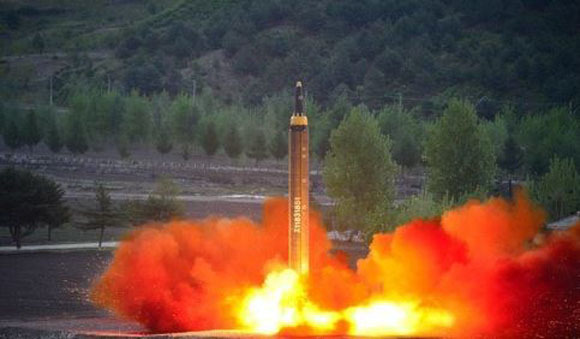Ukraine’s top diplomat in Seoul on Thursday denied allegations that North Korea might have obtained rocket engines used in its recently tested long-range missiles from Ukraine.
Charge d‘Affaires Taras Fedunkiv, the acting Ukrainian ambassador to Seoul, still suspected that North Korea could not have been able to advance its missile technology “without outside help,” calling for an international probe to find “who was responsible.”
“The production lines for building these types of rockets in Ukraine were decommissioned in 1992. The expertise cannot be carried in the heads of rogue scientists. The instructions are included in complex manuals locked in top-security facilities guarded by our security forces,” he said in a written interview with Yonhap News Agency, citing Ukraine’s Foreign Minister Pavlo Klimkin‘s recent op-ed in the New York Times.
 |
(Yonhap) |
“Not only would it be virtually impossible for criminals to access these manuals, but also any effort could not go unnoticed by our government,” he added.
Citing a study by Michael Elleman, a missile expert at the International Institute for Strategic Studies, the New York Times reported on Aug. 14 that North Korea could have got its hands on technology needed for the success of the recent missile launches through black market purchases of rocket engines from Ukraine.
The Ukrainian government has immediately denied the suspicion, with its Foreign Minister Klimkin in the mentioned op-ed, saying, “No evidence has been provided to support the claims.”
It earlier launched its own investigation.
“Ukraine has a reliable state export control system. Its long-term irreproachable operation allowed our state to become a reliable international partner and participant of all, without exception, international export control regimes, including the Missile Technology Control Regime,” Fedunkiv said.
“Ukraine holds a responsible foreign policy in the field of military-technical cooperation and continues to modernize its own export control system with a view to reliably prevent any forbidden activity, strengthening the nonproliferation regime of weapons of mass destruction and means of their delivery,” he added.
In July, the North claimed that it successfully test-fired two intercontinental ballistic missiles capable of delivering a nuclear weapon to the continental US.
It drew fierce condemnation from the international community and also sparked questions as to how it was possible for Pyongyang to make such a marked stride in its missile technology in a short period of time.
Fedunkiv expressed suspicion that there might have been outside help to make it happen.
“I am doubtful that North Korea could achieve what it has done without outside help. The global community must now come together to conduct an international inquiry to find out who was responsible,” he said.
With regard to Russia throwing weight behind the allegation that Ukraine might have been behind the missile technology leaks to the North, the country called on Moscow to do its share of work to clear up any suspicion.
“First of all, the same level of transparency should be demonstrated by the Russian Federation,” Ukraine’s President Petro Poroshenko earlier said, referring to his country‘s recent investigation on the issue.
The acting ambassador renewed Ukraine’s support for “diplomatic” efforts to resolve North Korea‘s nuclear stalemate, along with the “strict” enforcement of sanctions on its regime.
“Ukraine pays special attention to the settlement of the situation on the Korean Peninsula, in particular as a non-permanent member of the United Nations Security Council,” he said.
“For Ukraine, the key principle of resolving the problems associated with the DPRK’s nuclear program is the continuation of the diplomatic dialogue and the strict observance of the sanctions regime from the very beginning of its implementation,” he noted.
DPRK stands for the Democratic People‘s Republic of Korea, North Korea’s official name. (Yonhap)








![[Weekender] Korea's traditional sauce culture gains global recognition](http://res.heraldm.com/phpwas/restmb_idxmake.php?idx=644&simg=/content/image/2024/11/21/20241121050153_0.jpg)